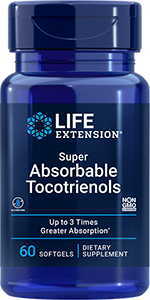 | March 8, 2011 | Apple polyphenols extend life span in fruit fly experiment | | The March 9, 2011 issue of the American Chemical Society's Journal of Agricultural and Food Chemistry reported the discovery of researchers at the Chinese University of Hong Kong that the administration of apple polyphenols to Drosophila melanogaster (otherwise known as fruit flies) resulted in longer average life span and the increased expression of genes involved in the production of antioxidant enzymes. In their introduction to the article, Zhen-Yu Chen and colleagues note that apples are an excellent source of antioxidants, which help prevent some of the damage caused by free radicals. Polyphenols found in other fruits as well as vegetables have also been shown to have potent antioxidant properties. The current study evaluated apple polyphenols' effects on fruit flies, a common test subject in longevity experiments. Treatment with the polyphenols extended the insects' average life span by 10 percent and prolonged their ability to walk and climb. Apple polyphenols also reversed markers of aging and imminent death, while upregulating the genes for superoxide dismutase (SOD) 1, SOD2 and catalase. Flies in which the genes for superoxide dismutase and catalase were knocked out failed to experience prolonged survival, indicating that apple polyphenols' life-extending mechanism is at least partly mediated by its action on these genes. While the benefits of oral administration of some compounds have been hypothesized to be the possible result of inadvertent calorie restriction due to the animals' decreased intake of food enhanced with a substance they find unpalatable or that could act as an appetite-suppressant, examination of the insects and measurement of average body weight failed to indicate a calorie-restrictive effect, demonstrating that the benefits associated with polyphenols were not due to this mechanism. The study, which is the first to associate an extension of life span to consumption of apples, adds evidence to the benefits revealed in other investigations, including a study that found a decrease in heart disease risk in women who consumed the fruit. It also lends credence to the "apple a day" adage, which could prove to be valid in future clinical research. | |  |  | | Most people with chronic constipation are advised to exercise and increase their intake of fiber and liquids. While these measures are effective for some people, they do not work for everybody. Many people also use fiber supplements. However, fiber supplements aren't always effective. The Life Extension Foundation® has identified superior forms of fiber that may help relieve constipation when traditional fiber supplements are not adequate. If the above measures do not relieve constipation, nutritional laxatives should be considered. There are many kinds of laxatives, but using peristaltic-stimulating laxatives, which also provide health benefits, is the safest choice. Because constipation can be caused by serious medical conditions, such as cancer, a sudden change in bowel habits among middle-aged or elderly people warrants a thorough evaluation by a physician. The average American eats only 10 to 15 grams (g) of fiber daily. Typical recommendations are 25 to 50 g of dietary fiber daily (Slavin JL 1987). Fiber is excellent for overall intestinal health and for alleviating chronic constipation. Although humans cannot digest fiber, the 5 pounds of friendly bacteria present in our digestive tract use fiber for fermentation and production of useful short-chain fatty acids that the cells of the intestine use for energy. Most foods contain a mixture of soluble and insoluble fiber. Both are important in treating constipation. Soluble fiber is contained in oats, apples, lentils, barley, breads, and cereals. It is able to mix evenly with water, forming a soft gel. Insoluble fiber is contained in raw wheat bran, other whole grains, and fruits and vegetables. It mixes unevenly with water, forming a soft pulp. Your body does not absorb soluble or insoluble fiber during digestion. Fiber contributes volume to the stool mass, making it easier for the colon to push and propel larger and softer stools out of the body. Insoluble fiber encourages contraction of the colon. Both fiber types contribute volume to individual stool masses. | Life Extension Magazine® March 2011 Issue Now Online! 
- On the cover:
- Reports:
- Departments:
- Journal abstracts:
| |  |   |  Life Extension Mix™ saves time and money by combining the most popular nutrient supplements into one product, eliminating the need to take separate B-complex, vitamins C and E, mineral supplements, and much more that would be required to achieve the same effects. Life Extension Mix™ supplies the most powerful antioxidants, including water- and fat-soluble vitamin C, vitamin E, and plant extracts that help protect against cellular DNA damage. Other ingredients enhance beneficial DNA methylation patterns, help maintain glycemic control, and help prevent the oxidation of LDL that contributes to the buildup of deposits in the endothelial lining. Life Extension Mix™ is the cornerstone of a comprehensive supplement program because it provides so many well-studied nutrients. If you are on a budget, the Life Extension Mix™ provides the best "cost-per-milligram" value. | | | Super Absorbable Tocotrienols   |  Super-Absorbable Tocotrienols combats the underlying causes of hair loss, supporting otherwise healthy hair follicles that genetic disposition, advancing age, high concentrations of DHT (the male hormone dihydrotestosterone), and sebum build-up may cause to weaken, degrade or shrink. Super-Absorbable Tocotrienols, a natural, orally administered, bio-enhanced tocotrienol complex, can be taken to support youthful hair thickness and growth. Through a revolutionary, patented delivery system, Super-Absorbable Tocotrienols ensures optimal absorption and efficiently delivers the benefits of a unique proprietary complex of phytonutrients (squalene, phytosterols and trace amounts of mixed carotene) naturally extracted together with tocotrienols to support youthful hair growth, hair health and hair density. In an unpublished study involving 30 volunteers who took tocotrienol supplements for eight months, nearly all the subjects showed significant improvement in hair thickness and density. | | | |  | Life Extension Update | What's Hot | Life Extension Magazine® | |
















